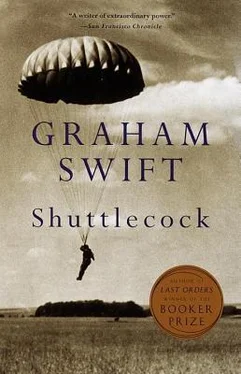And what happens? I work up vain enthusiasm. They stubbornly refuse to enter the spirit of the game. They look bored. They want to know what the time is. There is something on television. They moan about being made to run and they argue about who should fetch the ball when, in a spasm of frustration, I take an excessive, but not unpleasing swipe with the bat, which sends it into the distance. They fail to be impressed by or to seek to emulate my expertise with the frisbee (I am very good at the under-hand boomerang shot). They look upon me as some sort of demented PT instructor. All this simply isn’t natural. And I have to confess another thing. Once, last summer (this is only one of a number of similar instances), when Martin was being particularly troublesome, pretending not to have found one of those knocked-for-six balls, which, when I walked over to him, he suddenly ‘spotted’ at his feet in the long grass beneath a tree, I had this sudden urge, as he stooped to pick it up, to raise my bat and bring it down, hard, like a club, on the back of his head. I could have done it, I really could.
So we go less and less to the common. Now I wouldn’t mind if it was just I who was the obstacle — if Martin and Peter went off to the common to play by themselves — but they don’t do this either. And these days it seems that I too, for some inexplicable reason, for some spiteful reason, because what I really want to do is precisely the opposite, am choosing to stay indoors when we could go out.
Today, for instance, is Saturday, the very last day in April. The weather’s still fine and warm. It’s been exceptionally fine all week. Everything’s grown so much in only a few days: the chestnuts on the common, the May trees, the sycamores — but enough of that. Marian slips an arm around me while she makes a morning cup of coffee. I still haven’t told her, incidentally, about my promotion.
‘Darling, why don’t we go out somewhere today after lunch — even before lunch? A picnic? We’ve done the shopping; there’s nothing to stop us. It’s the first decent Saturday of the year.’
And almost immediately, because it’s Marian who’s said it, not me, and even though the very same idea has been crossing my mind since breakfast, I say: ‘I don’t know. I’ve got things to do.’
‘What things?’
‘Oh, odd jobs. This and that.’
Lies, of course. There’s nothing I have to do. Though I suddenly see what I can do, what I will do.
‘Well, tomorrow,’ Marian says forbearingly. ‘If it’s still nice.’
‘I’m going to see Dad tomorrow.’
Marian looks peevish. This is a sore point. Because I insist on my visits to Dad, we lose days together.
‘I thought we might go to Richmond and walk along the river.’
I know why she has said this. It is one of my favourite short outings. There’s a pub on the river bank with seats outside where children can sit. Then you can walk along the towpath, upstream, past Ham House, as far as Teddington Lock if you want.
‘It’d be nice,’ she adds, and gives me a little solicitous look. I know what it means. It means that for some while now she’s been noticing there’s something on my mind, I’m wound up about something. She daren’t ask directly what it is, of course. She knows better than that. But her wisdom tells her what might be a remedy for it: relaxation; air; the sun on the water; dipping willows. You see, Marian is really a very good woman.
‘No.’ I shake my head. ‘But it’s all right — you go.’
Now this is a sharp move. It means that Marian must either say, ‘Well, I’m not going if you’re not coming,’ and then we bicker and have a scene; or she really must go without me and run the risk of seeming to neglect me. In the end she plumps (just as I would too) for bold assertion.
‘Okay. I will. I’ll enjoy it too.’
But now there’s an atmosphere of hostility.
‘I’ll take the car then?’ she adds.
‘No you won’t.’
‘Why not?’
‘Because you won’t take the car, that’s why.’ (I want the car for my own reasons.)
‘Well, how do we get to Richmond?’
‘You can take a bus. You’ve heard about buses? A number 37, all the way. I’ll even give you the fare.’
‘Thanks.’
She plonks a cup of coffee down in front of me. We might as well have had an all-out scene. But she can still change her mind.
‘Won’t you come?’ she says after a sullen, coffee-sipping pause. The first sign of real weakness.
‘No!’ I say adamantly.
I go into the living-room, shutting the kitchen door. The boys are lolling about, reading comics. The television is still in the living-room. The boys could switch it on — there are Saturday morning programmes for kids — but they daren’t. They know I’d hit them.
I clap my hands, like an animal-trainer. ‘Right, you’re going out this afternoon, for a walk by the river at Richmond.’
They give me slow, uninterested looks.
‘It’s all right, I’m not coming. I’ve got things to do. You’re going with Mum — it’s her idea — on the bus.’ And almost immediately their eyes, which only a second before had been full of reluctance, begin to show enthusiasm — and relief. This hurts me. Believe me, it does. You see, when I said I didn’t mind if it was just I who was the obstacle, that was a lie. What is it that Marian’s got that I haven’t got? Why do the kids have no axe to grind with Marian?
‘Will we go to the pub?’ Peter asks.
‘No. You’re not going till after lunch. But there’s a café. I expect you’ll get an ice-cream or a drink. If you’re good.’
Martin looks up at me resentfully. I fancy that out of the corner of one eye he is glancing slyly towards the television then back to me. That is the difference between Martin and Peter. Peter is the one who got the shaking last Monday, but he has almost forgotten it. Martin is growing up (he will be eleven soon): he bears grudges.
I fish in my pocket. ‘Martin, come here.’ I pull out four pound notes and when Martin gets up I hold them out to him.
‘These are for you. When you get on the bus, you pay for the fares. Don’t let Mum pay for anything, understand? And, if there’s any change, I want it back.’
‘Yes Dad.’
I look into his shifting, sharp little face. He is probably already thinking of ways to pocket the money, or at least hold onto the change. I wonder whether Marian will stand for it, whether it’ll make her feel uncomfortable, or whether she’ll insist on paying with her own money. And what will Martin do if Marian tells him to keep hold of the money? I look at him. He has cunning, grey-blue eyes under his mop of sandy hair. He’s clever enough to understand all this, and to see that I’m testing him.
‘Right, put it somewhere safe.’
Later, after lunch, when Marian and the boys have gone, I get down the copy of Dad’s book from the shelf in the living-room and start to read it. I read from either of the two copies indiscriminately, picking up whichever is to hand, but naturally the one I value more is the one inscribed by Dad himself. I keep this in our bedroom. That is, usually. For as I sit down now to read the copy from the living-room I discover that at some time or other I have got the two muddled up. The one I have opened has Dad’s words in it. ‘… From your loving Father. September 1957.’
I sit down in the armchair by the french windows. The afternoon sun has crept round to shine slant-wise across the garden, and its rays fall obliquely on the glass. The sky is cloudless. I could, of course, sit outside. I look at my watch. It has just turned two. I have about three hours. I could put up a deck-chair on the grass. But I want to feel, though of course it isn’t the case at all, that I have been deliberately left behind and forbidden to go out. I want to feel they have gone and left me like some wicked child being punished or some unwanted kill-joy. But what I really want is to read Dad’s book.
Читать дальше












